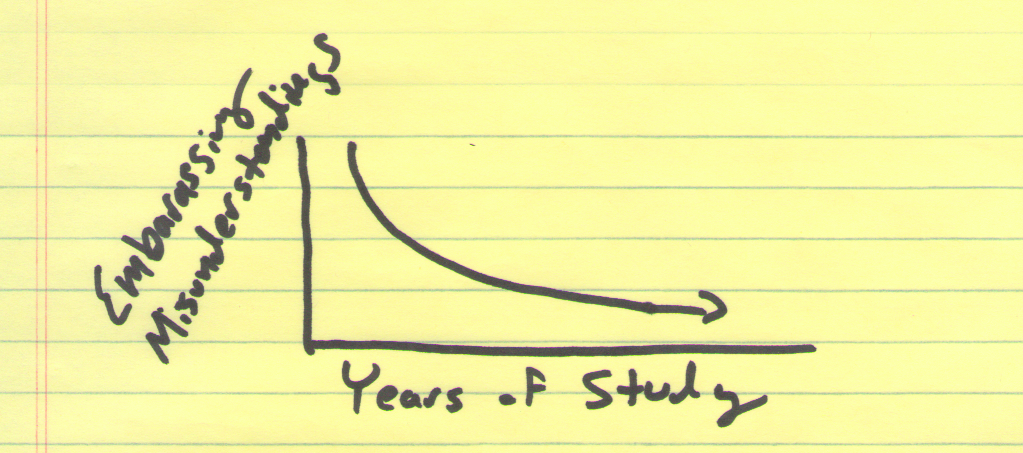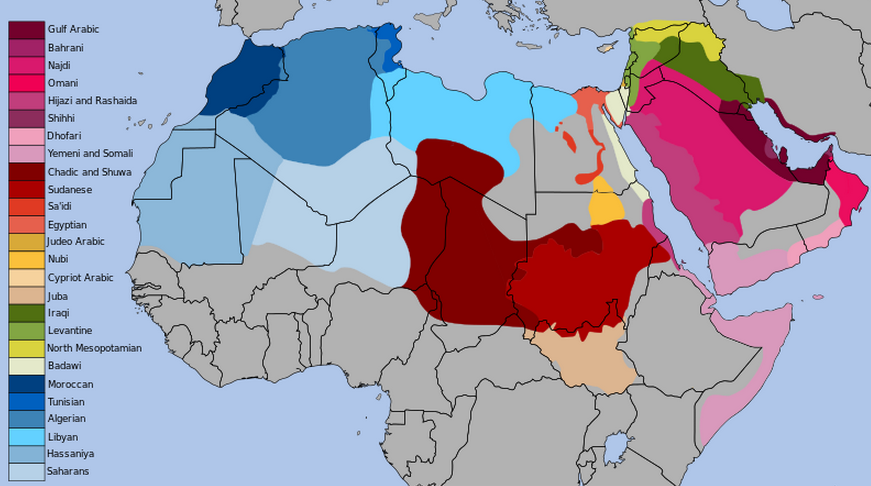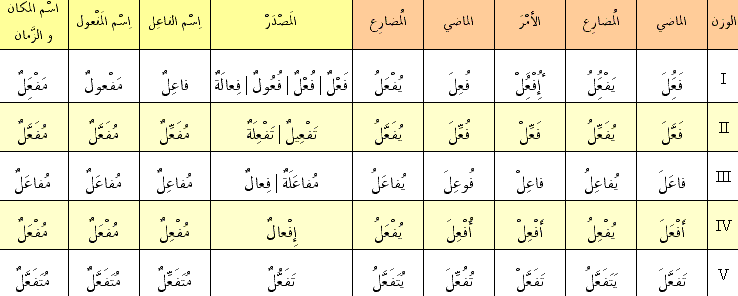By Will Ward
Cairo, Egypt — 11pm — About 9 years ago
“3ayz aru7 el-mat3m” I repeated to the cab driver, getting more frustrated as he cruised around the city.
I was a few weeks into my summer course in Arabic at the American University in Cairo. It was my first time studying the language and my parents were coming to visit.
They were landing that night. I was supposed to meet them at the airport outside customs. I had lost track of time at a bar with some friends when I realized it was time to head to the airport.
We had been driving around for half an hour but it didn’t look like we were on a going-to-the-airport kind of road.
“El-mat3m” I repeated, making the motion of a plane landing on my arm. “Ahhh el-Mataar — ze airbort” said the cab driver, grasping now what the frantic, slightly tipsy American wanted.
I later realized I had spent 30 minutes telling my driver to “take me to the restaurant” and, he was (sort of) trying to oblige me by driving around Cairo in circles. I don’t know – maybe he was hoping we would randomly hit the right restaurant.
The Awful Truth About How To Learn Arabic
From my experience, it takes 3 to 5 years of hard study to become practically useful at Arabic. What do I mean by “practically useful”?
- Able to read a newspaper article without having to look up most key words
- Able to have more than a basic conversation beyond the cab driver back-and-forth
So if you are counting on taking a couple college courses and calling it a day, you’re probably wasting your time unless your objective is to be able to order falafel sandwiches (or you were a “false beginner” like my wife who grew up speaking it at home).
In fact, I have seen people at advanced levels of academic Arabic struggle to order a bottle of water. (Confusingly, the word for “bottle” and how you pronounce “water” vary greatly from place to place.)
Since that night in Cairo (btw, my parents gave up on me and ended up getting a cab on their own) I’ve gotten a masters degree in Middle Eastern studies, lived in Egypt for 2 years, spent time in Syria, Lebanon, Libya, and Morocco, and now run an English Arabic translation company.
But I still hesitate to say that I “know” Arabic. While I am able to read and write fusha (Modern Standard Arabic) I would sound like an idiot if I had to go on a TV debate show. And while I am comfortable with the local dialects in Egypt or Syria, I had no idea what was going on in Libya.
Arabic is constantly humbling and one of those things that is always humbling and if you are lucky and work hard, your learning curve will look something like this:

Why Arabic Is Hard
Many people think the unfamiliar alphabet and the fact that it’s written right-to-left makes learning Arabic so challenging.
But the alphabet is the least of your worries. It takes just a week or two to learn it and there are a lot of good tools and apps out there to help you. The really hard things for English speakers are:
Sounds: Arabic has at least 7 sounds that do not appear anywhere in English: ع ض ص ط ظ ق ح. This video I found has a good explanation of them (don’t get distracted by his epic beard. Okay do, it’s fine):
http://www.youtube.com/watch?v=hWLAFkLeaVc
Diglossia: This is a concept that doesn’t really exist in English. It means that Arabic has two main registers. Each register has its own grammar rules, pronunciation and vocabulary for common words – a high (fusha, or Modern Standard Arabic) and a colloquial (amiyya, or regional dialect). If you are reading a newspaper, writing a constitution or delivering a formal speech you will be operating in fusha. If you are talking with your friends and family or ordering in a restaurant you will be using amiyya. This is a huge topic, but the important thing for language learners is that university Arabic classes focus on fusha which is seen as more prestigious and professionally useful. The problem is that people in the “real world” don’t speak formal Arabic. So when you show up the the Arab world after a few years of academic Arabic and try to rent a flat using fusha people will look at you like you’re speaking Shakespearian English in Tony Soprano’s New Jersey.
Dialects: Not only will you have to learn the high and low Arabic to be considered fully proficient, but the colloquial Arabic differs from country to country. So after you have learned that the word for “table” (and it’s these day-to-day words that change the most) is tawilah in MSA but tarabeza in Egyptian, be prepared to get strange looks in Iraq because there they call it a mayz in certain places…

Grammar: I am not a linguistics geek and don’t have a lot of the vocabulary to explain exactly why Arabic grammar is hard. But suffice it to say that you will be spending a good deal of time with charts like the one below, especially if you are learning at a place that is big on grammar-translation in their teaching style.

So Without Further Ado …
Will’s Seven Commandments Of Learning Arabic
I often get asked for advice on learning Arabic so I’m compiling my usual sermon here so I can write it once and be done with it. Your suggestions and additions are welcome. This is what has worked for me but of course your mileage may vary…
1. Don’t Sprint.
Learning Arabic is jumping into the ocean not the swimming pool. No single test, course, or even year of your study will get you there so you need to play the long game. You are trying to get a compounding effect over many years of study; pushing too hard risks burnout.
2. Skip Forward A Class If You Can.
This is not a contradiction to Commandment 1. In most programs, a lot of Arabic 2 is re-teaching Arabic 1. If you come in knowing the alphabet going in and a few basic expressions, try to skip the first class or semester. Being around people who are more advanced than you is a great way to up-level yourself. You will sponge their knowledge like a newborn baby and by the end of the class you’ll be on the same level.
3. Don’t Try To Learn Arabic While You Work Full Time
For me, I know I have a golden hour every day, maybe two or three if I’m lucky when my brain can get good, high glucose work done. You will need to invest those hours into your Arabic practice to get anywhere. I remember pounding nescafes trying to get enough caffeine to stay awake through Arabic classes after my full time job was done. Needless to say I didn’t retain a lot of what I learned in those classes and didn’t have a lot of time to do enough studying and unstructured reading. If you at all can, try to study full time.
4. Study Abroad. In Bursts.
University programs are fine for learning grammar and vocab, but you really need to be living in the Arab world to even start to understand the nuances of how diglossia and dialects work. Despite the headlines, Egypt is a wonderful place to go and I’ve also heard great things about Yemen. I had some amazing experiences studying Arabic in Syria, but sadly that’s not an option now. But I found that once I’d been studying for about 6 or 8 weeks I would start to plateau and get bored, but the faster progress would return after I left for a while and came back. I’m not exactly sure why this is, but it happened to me several times, so I think there’s something there.
5. Don’t Study MSA & Colloquial At Once.
This gets less important as you are more advanced, but during the first 2 years or so of study, when you are really trying to solidify the grammar in your mind it’s best to only focus on one or the other because the grammar, pronunciation, and vocabulary can be significantly different and you will get confused.
6. Get A Private Tutor ASAP.
I’ve made some of my fastest progress working with a private tutor. If you are trying to learn fast, once you’ve got the basic grammar down its often the best use of your time and money to just get a private tutor and work with them 1-2 hours per day. This is often cheaper than taking university courses and you get much more value in terms of personal attention and matching the work to your needs. Plus you make friends with your tutor, get to go to their house, and typically get privy to a lot of cultural knowledge that you wouldn’t get in a classroom setting.
7. If You Are White, Don’t Wear A Galabiya.
In every Arabic course for foreigners, there is always one guy who thinks he will “blend in” by going down to the souk and getting a traditional Arabic man-gown to wear to class. This is a horrible idea on many levels – trust me.

Some More Resources
Hans Wehr Dictionary: The ultimate Arabic-English dictionary. It takes some getting used to because it’s organized by root rather than (all Arabic words are built around three-letter roots) so you will need to know how to find the roots in words before it is useful. But once you can use it, it’s incredibly comprehensive. As my Arabic professor in college used to say: “I never leave home with out Hans, unless I’m going to the airport.”
Al-Kitaab: The most widely-used college textbook for Modern Standard Arabic. It does a good job of breaking up the grammar into manageable chunks and relies more and more heavily on video lessons. The series has its haters but the bottom line is that if you are studying Arabic at the university level, you will almost certainly use this series at some point, so stop complaining and learn to love Maha.
Kalaam Gamiil: This is a course in Egyptian colloquial Arabic. I used an early edition of the series while living in Egypt from 2007-9. The companion videos are great.
Arabic Language Institute: Put on by the American University in Cairo, this is the first course I took in Arabic and I had a wonderful experience. Top notch faculty, interesting classmates, and good logistics to ease Arabic newbies into life in Cairo. I’m not sure if the classes are still taught in their downtown old campus or in their New Cairo (aka an hour straight out into the desert) campus that opened in 2008. If it’s at the new facility and you want live in central Cairo (which you should) you will probably be spending at least 2 hours a day on busses to get to campus. Fair warning.
Center for Arabic Study Abroad (CASA): This is the ninja-level program for US citizens who are already really good at Arabic. It’s a year of study, all on scholarship where you will be writing essays and reading novels in Arabic. I always wanted to do this program but was ready to move on from Egypt after living there for a while and never applied. This is pretty much the gold standard qualification for really advanced Arabic, for government, academia or other employment purposes.
Private Tutors: I’ve worked with some amazing tutors over the years. If you’re interested, contact me and I can put you in touch. Some do lessons over Skype so you can study remotely.
P.S. If you have any other good pieces of advice or questions about learning Arabic leave a comment and I’ll do my best to help.


15 thoughts on “The 7 Crack Commandments Of Learning Arabic”
There’s Affordable online Arabic lessons via Skype,live classes with one native Arabic teacher to each student,all classes are taught for your specific needs and your level
http://arabic291.blogspot.com/
https://www.facebook.com/arabic291/info
I absolutely loved it !
Hi
I was wondering if you had any more advice on learning Arabic by using a language school in Cairo but only online? These are one to one lessons twice a week and they are a lot cheaper than private tuition face to face that would otherwise cost me 200 euros a month for one weekly lesson… I think that might be too cost prohibitive and so I hoped to be able to start my studies via skype and then go to Cairo for 1 month at the end of the six months learning to make further progress?
Thank you.
Evelina
Hi Evelina,
I believe the Arab Academy has an excellent online Arabic course from beginner to advanced level. It should be cheaper than classes and it also has a study abroad option if you wanted to do that at some point.
Hello,
So just out of curiosity, if someone were to become relatively proficient in Fusha, how long would it take to get a good grasp on one of the arabic dialects? Specifically Shammi(or levantine).
Hi,
It won’t take long, if you already know fusha. In my opinion knowing an arabic dialects first, by chatting with Arab or visiting an Arab country, would make it easier then to learn the fusha. Both are important.
Hi there,
I would like to know what is the best way to learn Abou the roots and patterns of the Arabic words? Spoek thing that’s linked somehow to the english grammar or sentence structure.
Thank you
memorise them! it doesn’t take long, I make all my students learn them by heart, it takes a few weeks and then you will know them all for life.
very useful article, thanks 🙂
Join us, network with other Arabic students to learn and practice Arabic language!
http://www.facebook.com/arabic291
3-5 Years? That is kind of a long shot if you have the right dedication and guidance. I don’t agree with that sentiment at all. This article sounds very pessimistic and not as “motivating.” Studying all day is pretty stupid as well since that is a great way of “burning out.”
Don’t listen to this guy everyone. There are many resources out there and applications that make it easier and FUN.
The grammar is NOT hard at all, if you have the right teacher to explain it, or have a knack for languages. Arabic grammar is extremely logical. In terms of acquisition in varies from person to person. I know people who’ve never left the UK but have a mastery of it (they’ve studied it with indian/pakistani teachers in madrassahs), and people like my self with a degree in Arabic but with mastery no where in sight. The local languages make it extremely tricky but you won’t be hard pressed to find someone whom speaks MSA/Fusha.
best of luck!
Oh an Al-kitaab is not worth the paper it is written on! Use a classical grammar (Ajrumiyaa/nahw meer et al) and a conversational book like Asasi (American University of Cairo) or Arabiya Bayna yadaik (Arabic between your hands).
good
Diglossia very much exists in English…African American English, Patois…etc…
How can I tell if a resource is Egyptian, Modern Standard Arabic, or other if it is not labeled?
Comments are closed.